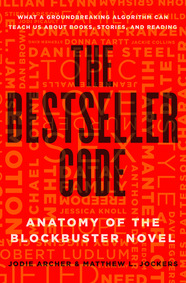Quillwitch
Basic
I lovely little talk worth listening to, given by a UK literary agent.
Follow along with the video below to see how to install our site as a web app on your home screen.
Note: This feature may not be available in some browsers.
Café Life is the Colony's main hangout, watering hole and meeting point.
This is a place where you'll meet and make writing friends, and indulge in stratospherically-elevated wit or barometrically low humour.
Some Colonists pop in religiously every day before or after work. Others we see here less regularly, but all are equally welcome. Two important grounds rules…
We now allow political discussion, but strongly suggest it takes place in the Steam Room, which is a private sub-forum within Café Life. It’s only accessible to Full Members.
You can dismiss this notice by clicking the "x" box
Thanks for posting! Interesting. If I can summarise for others, he identifies 5 points he says agents look for:
1. Bridge - something familiar to hook the work onto / hook the reader in -- this book is 'famous novel x meets famous novel y'
2. voice - the unique voice of the author, something only they can write
3. graft -- the hard work, multiple drafts need to have been done
4. resonance - will it resonate with as many readers as poss as quickly as poss? -- partly zeitgeist-dependent, partly to do with deep, eternal emotional triggers
5. the gaps - does the author leave 'gaps between the lines' that the reader can populate with their own imagination? -- very important
He also says it's critical to be able to concisely explain what the book is about in one sentence, no matter how complex the story.

I think the number one element to focus on, is actually number 2. Voice. In the sense that it´s so unique, ( or should be), and will be what draws the reader in. A certain flow of words that seem to hypnotize the readers.

There's a book due out on the 20th September, which will tell us what we should put in our manuscript for it to become a best-selling book.
That's the trouble, isn't it -- no universally right or wrong answers.Thanks @Marc Joan for the list (can't watch the vid at work).
My biggest issue is #5. I'm editing my space opera and it started at 93k words. Now, it's close to 70k and I'm only half way done with the latest edit. I've cut three chapters, reworked others, and cut so much over writing that I might as well have put the whole MS in a gigantic slap chop. The MS is nearing a good place, but the fact that I wrote over 20k words TOO MANY is just ridiculous.
Talk about NO gap...
Now I just have to hope that when I send the pared down MS to an agent they don't come back with "I wanted some meat with my taters."
Thanks @Marc Joan for the list (can't watch the vid at work).
My biggest issue is #5. I'm editing my space opera and it started at 93k words. Now, it's close to 70k and I'm only half way done with the latest edit. I've cut three chapters, reworked others, and cut so much over writing that I might as well have put the whole MS in a gigantic slap chop. The MS is nearing a good place, but the fact that I wrote over 20k words TOO MANY is just ridiculous.
Talk about NO gap...
Now I just have to hope that when I send the pared down MS to an agent they don't come back with "I wanted some meat with my taters."
